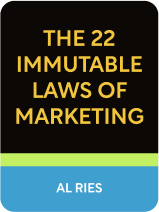

This article is an excerpt from the Shortform book guide to "The 22 Immutable Laws of Marketing" by Al Ries and Jack Trout. Shortform has the world's best summaries and analyses of books you should be reading.
Like this article? Sign up for a free trial here .
What is the Law of Focus? How can associating your brand with a word increase your sales?
Law #5 of The 22 Immutable Laws of Marketing is the Law of Focus. It says that a successful marketing strategy can create a universal association between your word and your product. This also relates to the Law of Exclusivity which says that you can’t use another brand’s word.
Continue on for more information about the 5th and 6th laws of marketing.
Focus Your Message
In order to get consumers to notice and remember your product, you need to broadcast a unique, focused message. Marketing with a focused message for a specific audience gets the most traction. Use these laws to define your product in a way that’s concise and appealing to customers. Laws 5 and 6 out of The 22 Immutable Laws of Marketing deal with focus. They are the Law of Focus and the Law of Exclusivity.
The Law of Focus
To create a powerful, lasting perception in the mind of the public, you need to center your marketing plan around a single word. This word should sum up the primary message you want consumers to remember about your brand—whether it’s “reliability,” “affordable,” or “service.” A successful marketing strategy can create a universal association between your word and your product. The word can relate to various aspects of your product or service:
- Audience (such as “professionals”)
- Benefits (such as “safety”)
- Sales (such as “top-rated”)
- Services (such as “convenience”)
When choosing a word, consider these tips:
- Make it simple. Even if your product or market is complex, a single, simple word is more effective than multiple words. As such, creating this narrow focus takes discipline. Naturally, enthusiastic CEOs and marketers want to tell consumers about all of their products’ great features, but less is more.
- Be specific. Focus on a word that sets you apart from your competitors. A word like “quality” is too vague to be tied to any one brand, because every company is going to claim to have a quality product. Your word must have an opposite that another company could feasibly claim. For example, the word “affordable” works well because your competitor could go the other direction with “luxury.”
- Use a loaded word. Effective words create a halo effect, meaning that they imply that your product also has other desirable characteristics. For example, if you market your cars as “reliable,” that word can also imply that the car is safe, long-lasting, and easy to maintain.
If you’re the market leader, you’ve got it easy: The market leader’s word is often the product category. In other words, the brand name serves as a generic name for the category. For example, Saran Wrap has become a generic name for cellophane. By comparison, Mercedes couldn’t claim the word “car,” so the company built its success on the word “engineering” by boasting state-of-the-art features and innovations.
Choose an Attribute
When choosing the word for your brand, first determine the attribute that customers value most in this product. For example, in the toothpaste market, the most important attribute is the ability to fight cavities. If another brand has already successfully focused on the top attribute, move on to the next-best, opposite attribute.
If you try to claim an attribute that’s similar to your competitor’s, you’ll merely end up in their shadow. Instead, establish yourself as the go-to alternative for those who don’t want the other guy’s attribute. Once you choose your attribute to focus on, emphasize its value in order to increase your market share. Although consumers may have prioritized the market leader’s attribute in the past, the tides can turn in your favor. For example, Gillette built its dominance as the market leader of razor blades by boasting high-tech, durable razors and cartridges. When a small French startup started marketing the opposite—disposable razors—it went against what Gillette’s sales proved customers wanted. However, despite the past success of durable razors, disposable razors grew to dominate the razor blade industry overall. Gillette wisely knew better than to rest on its laurels, and it launched its own Good News disposable razor that became the market leader.
The Law of Exclusivity
When you choose your focus word, make sure that none of your competitors is already using it. The goal is to create an undeniable association between the word and your brand, and you can’t achieve that if another firm is using the same word. Even if you have a lot of money to throw at the marketing campaign, you can’t co-opt a word that another company is already using. In fact, if you try, you could end up strengthening their message, because you’ll be emphasizing the importance of that word, which is already linked with that brand.
Sometimes marketers break this rule because extensive market research reveals that customers overwhelmingly value one particular attribute, so they use that word despite the fact that their competitor has already claimed it. Burger King fell into this trap: Research showed that the most valued trait in a fast-food restaurant was being fast, but McDonald’s had already claimed “fast.” Burger King forged ahead with the tagline “Best food for fast times,” and it backfired, leading to a significant downturn and eventual sale of the company.

———End of Preview———
Like what you just read? Read the rest of the world's best book summary and analysis of Al Ries and Jack Trout's "The 22 Immutable Laws of Marketing" at Shortform .
Here's what you'll find in our full The 22 Immutable Laws of Marketing summary :
- Why the quality of your product matters less than customers' perceptions of it
- Why trying to appeal to everyone will sink your sales
- How Marlboro sold more cigarettes to women by marketing to cowboys






